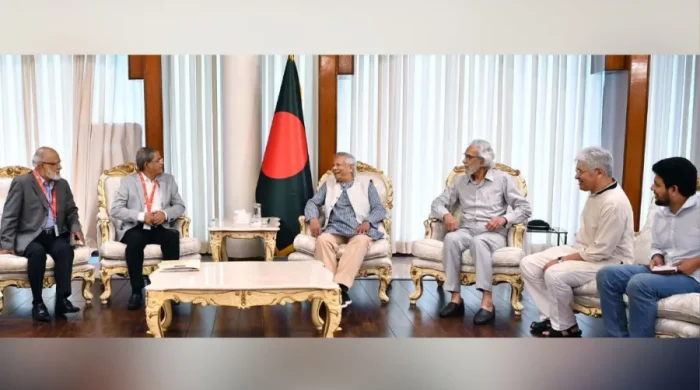

On Saturday, in the third round of talks with the interim government’s main adviser, political parties called for the creation of an Election Commission right once and a schedule for elections.
The six reform commissions that the temporary administration had constituted were the principal topic of discussion. Other subjects covered were the state of peace and order in the nation, the government’s response to turmoil in the apparel industry, and the measures the current administration is taking to get ready for the next election.
Chief Adviser Dr Mohammad Yunus held talks with the BNP, Jamaat-e-Islami, Ganatantra Mancha, Left Democratic Alliance, Hefazat-e-Islam Bangladesh, Islami Andolan Bangladesh, and the AB Party. The dialogue began with the BNP’s delegation at 2:30pm on Saturday at the State Guest House, Jamuna, Dhaka.
The last round of dialogues between the interim government and political parties was held on August 31.
BNP focuses on election
BNP Secretary General Mirza Fakhrul Islam Alamgir said that the Chief Adviser, Prof Muhammad Yunus, was asked for an election roadmap during the dialogue. BNP representatives expressed their views on various issues, including the election process, the Election Commission, and reforms to the election system.
Speaking to the media outside the Chief Adviser’s residence at around 4pm, Fakhrul said: “I asked the Chief Adviser for the election roadmap. I also called for the cancellation of the NID card law introduced by the Ministry of Home Affairs and for all Union Parishad elections to be halted. I stated that those involved in rigged elections must be held accountable under the law. Awami League officials still present in the administration should be removed.”
He also emphasized that the Election Commission should be formed through a consensus among major political parties and that its operations should be suspended until this happens. “I raised concerns about the prosecution of individuals involved in violent incidents and called for the cancellation of contract-based appointments. There are still 20 judges appointed by the Awami League government in the judiciary, and I demanded their removal. Additionally, those accused of corruption and murder should not be granted bail. I also urged the withdrawal of fabricated cases.”
Mirza Fakhrul further accused Prime Minister Sheikh Hasina of spreading false propaganda in India, urging the Indian government to take swift action. He discussed this matter with the interim government as well.
The BNP delegation also included BNP Standing Committee Members Dr. Khandaker Mosharraf Hossain, Mirza Abbas, Abdul Moyeen Khan, Nazrul Islam Khan, and Salahuddin Ahmed.
Jamaat reform proposal on October 9
In their dialogue with the Chief Adviser, Bangladesh Jamaat-e-Islami requested two roadmaps—one for reforms and the other for the election, said Jamaat-e-Islami Ameer Dr Shafiqur Rahman.
He explained: “Successful elections depend on successful reforms, and we emphasized the importance of both.”
Jamaat plans to present its party reform proposal at a press conference on October 9.
Dr Shafiqur added: “We have always maintained that the government should allow sufficient time for reforms. We will announce this timeline on October 9.”
At the press briefing, Shafiqur Rahman noted that discussions covered the country’s law-and-order situation, with a focus on uniting the nation against all forms of conspiracies. He expressed hope that the interim government would conduct elections impartially, without showing any bias toward political parties.
He also pointed out that the nation had been deprived of fair elections in the last three consecutive national elections.
“The government’s responsibility now is to create an environment for a fair, peaceful, and acceptable election. For this to happen, they need to address some fundamental issues,” he said.
Responding to questions about the members of the reform commission, he noted that Jamaat does not fully agree with all appointments. Additionally, the upcoming Durga Puja celebrations were discussed during the dialogue, with assurances that law enforcement and citizens would ensure the festival’s security.
Nayeb-e-Ameer and former lawmaker Dr Syed Abdullah Mohammad Taher, Maulana ANM Shamsul Islam, Nayeb-e-Ameer and former MP Prof Mujibur Rahman, and Assistant Secretary General and Rangpur-Dinajpur regional coordinator Maulana Abdul Halim also participated in the dialogue.
Call for stronger connections
During the meeting, leaders of Ganatantra Mancha urged the interim government to strengthen its communication with political parties. They proposed establishing a framework for regular meetings, possibly weekly or fortnightly, to which the government agreed.
Nagorik Oikya Convener Mahmudur Rahman Manna emphasized that their movement was not solely about changing the government or holding elections, but about creating a democratic state through electoral and constitutional reforms. “Reforms are necessary to prevent the return of fascism,” he said.
Ganatantra Mancha leaders also voiced concerns about administrative weaknesses, particularly within the police force. The Chief Adviser acknowledged these issues. Ganosamhati Andolan Chief Coordinator Zonayed Saki highlighted the importance of involving political parties, students, and various social groups in discussions on democratic elections. He suggested forming a National Political Council where such discussions could take place.
Biplobi Workers Party General Secretary Saiful Haque noted that the reform commission would begin its work on Sunday. He observed that there appeared to be some distance between the interim government and political parties, and called for more organic communication. “After the reform commission completes its work, there is room for consensus on the government’s next steps, which will be decided by the next elected parliament.”